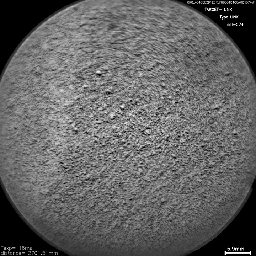
|
Laser Hit on Martian Sand Target, Before and After
- Click the image above for a larger view
 Movie Download Options
Movie Download Options- Full-Res JPEG (720 x 720) (102.3 kB)
- Full-Res TIFF (720 x 720) (519.1 kB)
Caption:
The Chemistry and Camera (ChemCam) instrument on NASA's Mars rover Curiosity used its laser and spectrometers to examine what chemical elements are in a drift of Martian sand during the mission's 74th Martian day, or sol (Oct. 20, 2012).
This pair of images from ChemCam's remote micro-imager shows the target, called "Crestaurum," before and after it was zapped 30 times by the instrument's laser. The dark pit created by the repeated laser hits is about one-eighth of an inch (3 millimeters) across. Crestaurum is within the "Rocknest" patch of windblown dust and sand. It was selected as a target surfaced with fine-grain sand. The distance to the target from the ChemCam instrument at the top of Curiosity's mast was 8 feet and 10 inches (2.7 meters).
Background Info:
JPL manages the Mars Science Laboratory/Curiosity for NASA's Science Mission Directorate in Washington. The rover was designed, developed and assembled at JPL, a division of the California Institute of Technology in Pasadena.
For more about NASA's Curiosity mission, visit: http://www.jpl.nasa.gov/msl , http://www.nasa.gov/mars , and http://marsprogram.jpl.nasa.gov/msl .
Cataloging Keywords:
| Name | Value | Additional Values |
|---|---|---|
| Target | Mars | |
| System | ||
| Target Type | Planet | |
| Mission | Mars Science Laboratory (MSL) | |
| Instrument Host | Curiosity Rover | |
| Host Type | Rover | |
| Instrument | Chemistry & Camera (ChemCam) | |
| Detector | ||
| Extra Keywords | Dust, Grayscale, Movie | |
| Acquisition Date | ||
| Release Date | 2012-10-22 | |
| Date in Caption | 2012-10-20 | |
| Image Credit | NASA/JPL-Caltech/LANL/CNES/IRAP/LPGN/CNRS | |
| Source | photojournal.jpl.nasa.gov/catalog/PIA16234 | |
| Identifier | PIA16234 | |
